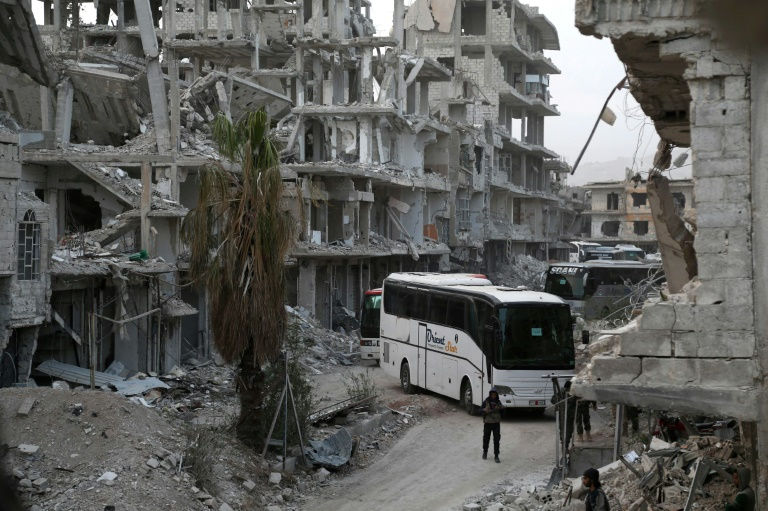
Hundreds of Syrian rebels and civilians quit the penultimate opposition-held pocket of Eastern Ghouta on Saturday, bringing the government ever closer to sealing its victory over the battered enclave.
Eastern Ghouta was the opposition’s final stronghold on the edge of Damascus, but beleaguered rebels are now left with less than 10 percent of their one-time bastion.
Since February 18, a Russian-backed air and ground assault has brought most of the area under government control, and Damascus is using evacuation deals to clear the last three pockets.
Talks are still ongoing for the final area around Ghouta’s largest town of Douma, but negotiated withdrawals have already been reached to clear two other zones.
Fighters from the Islamist Faylaq al-Rahman faction were the latest to leave Eastern Ghouta, following in the wake of another hardline group that quit the town of Harasta last week.
A convoy of 17 buses carrying 981 people, including rebels and civilians, drove out the battered enclave late Saturday, according to state news agency SANA.
Syrian state television said the evacuees were from Zamalka, Arbin, Jobar, and Ain Tarma — all held by Faylaq al-Rahman — and would be bussed to Idlib in the northwest.
The withdrawals will continue Sunday, with a total of 7,000 people expected to be bussed out under the deal.
AFP’s correspondent in nearby Harasta, which overlooks the meeting point for the convoy, saw more than a dozen buses gathering at the crossing over several hours.
Armed and masked Russian military personnel boarded each bus. Rebels were searched, then given food and drink by the Syrian Arab Red Crescent.
– Relatives buried under rubble –
The evacuations had been scheduled to begin Saturday morning, but a military source said they were delayed due to “logistical issues,” including unblocking and demining the route they would take.
Buses entered around 4:00 pm local time (1400 GMT), and fighters, their families, and other civilians began boarding them in Arbin as night fell.
Mohammad, 20, was among them and said his departure was bittersweet.
He and his two brothers survived bombardment on their hometown, but their father did not. They were unable to extract his body from the rubble for a funeral.
“What kills us is that we couldn’t bury our relatives. They stayed under the rubble,” Mohammad told AFP as he limped onto a bus with his siblings.
The government has implemented a “leave or die” strategy to retake Ghouta, reducing swathes of it to rubble with air strikes and artillery fire but keeping open the offer of evacuation.
The onslaught has killed more than 1,600 civilians, according to the Syrian Observatory for Human Rights.
Dozens have also been killed in rebel fire on Damascus, including a young Syrian footballer killed on Saturday despite the ongoing evacuations.
Samir Mohamad Massoud, 12, was killed in rocket fire on a prominent Damascus sports club, according to SANA.
State media said Saturday that more than 105,000 civilians have fled Ghouta in recent weeks.
The army has opened three “corridors” for people to flee from newly-recaptured territory into government zones.
Once the government had whittled down rebel territory to three isolated pockets, it pursued separate negotiations with the factions in each zone.
The first deal brokered by Russia was reached with the hardline Islamist group Ahrar al-Sham for the town of Harasta and saw more than 4,500 people, including over 1,400 fighters, evacuated to Idlib.
– ‘Losing my nerves’ –
The second agreement was reached with Faylaq al-Rahman on Friday and provides for evacuations, medical treatment for wounded civilians and fighters, and the release of detainees held by the rebel group.
Syrian state TV on Saturday interviewed eight men who said they had been detained by Faylaq and were released under the settlement.
Sabah al-Salloum desperately hoped her son Munzer, kidnapped four years ago by Ghouta rebels, would be among them.
“I heard from the news the kidnapped would be released, and I’m losing my nerves waiting. I couldn’t sleep,” Salloum told AFP.
Those being bussed out of Ghouta on Saturday include civilians, rebels, and some allied jihadists from Hayat Tahrir al-Sham, Syria’s former Al-Qaeda affiliate.
Observatory head Rami Abdel Rahman said the buses would go first to Idlib, then may head to Afrin — a flashpoint town recently captured by Turkey and its rebel proxies from Kurdish forces.
There was no immediate confirmation from Faylaq al-Rahman on whether their fighters were going to Afrin, but the faction is known to be backed by Ankara.
Syria’s conflict erupted in March 2011 with anti-government protests but has since drawn in world powers, including Turkey and Russia.
Moscow played a key role in the two agreements already reached and is mediating talks for the last pocket, held by Jaish al-Islam.
With the conflict grinding on into its eighth year, Syria’s government is more determined than ever to clear opposition holdouts around the capital to halt rebel rocket fire onto Damascus.




